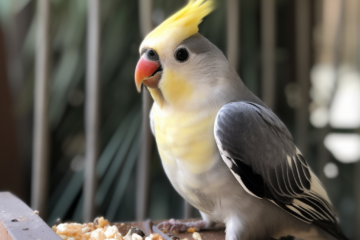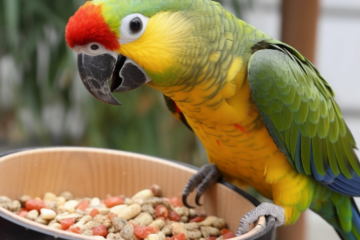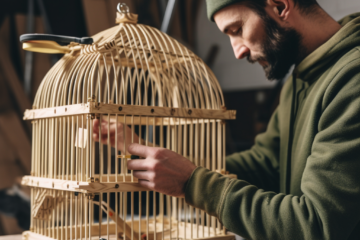Looking for the perfect pet that’s low-maintenance yet brings joy and chirps of happiness into your life? Look no further than birds! These feathered friends make for some of the best bird pets out there. Unlike high-energy dogs or aloof cats, birds strike a unique balance with their playful antics and calming presence. From colorful parakeets to intelligent cockatiels, there’s a bird breed to suit every personality and lifestyle. Dive into the world of avian companionship and discover why birds are not just pets but lifelong pals waiting to fill your home with melody and charm.
Best Bird Species for Beginners
Budgerigars (Budgies)
Budgerigars, commonly known as budgies, are ideal bird pets for beginners. Their small size and straightforward care requirements make them a popular choice. These vibrant birds are not only beautiful but also easy to handle and train. Budgies can be quite social, enjoying interaction with their owners through talking or mimicking sounds. Their cheerful chirping can bring life to any home environment.
-
Pros:
-
Small size
-
Easy care
-
Sociable nature
-
Cons:
-
Require regular socialization
-
Prone to health issues if not cared for properly
Cockatiels
Cockatiels are another excellent option for those new to bird ownership. These friendly creatures are known for their low-maintenance needs and gentle demeanor, making them wonderful companions. Cockatiels often bond closely with their owners, showing affection through cuddling and preening behaviors. With proper care and attention, these birds can live long lives while providing endless joy.
-
Pros:
-
Low-maintenance
-
Affectionate companionship
-
Long lifespan
-
Cons:
-
Can be noisy at times
-
Require mental stimulation
Lovebirds
For beginner bird enthusiasts seeking a more affectionate companion, lovebirds are an attractive choice. These small parrots thrive on social interaction and enjoy forming strong bonds with their owners. Lovebirds exhibit playful behavior and may even display signs of jealousy when they feel neglected by their human family members.
Top Friendly Pet Bird Species
African Grey Parrots
African Grey Parrots are highly intelligent birds that can form strong bonds with their owners. They are known for their exceptional ability to mimic human speech and sounds, making them fascinating companion birds. These parrots require mental stimulation to thrive, such as toys or puzzles that challenge their intellect. Moreover, African Grey Parrots have a long lifespan of up to 50-60 years, so they can be lifelong feathered companions.
One key advantage of having an African Grey Parrot as a pet is the deep bond they develop with their owners. This bond creates a sense of trust and affection between the bird and its human family members. However, it’s essential to note that these birds need consistent social interaction and mental stimulation; otherwise, they may develop behavioral issues like feather plucking due to boredom.
Quaker Parrots
Quaker Parrots, also known as Monk Parakeets, are sociable birds that enjoy human interaction. Their friendly nature makes them excellent pets for individuals looking for lively companionship. These small parrots are highly energetic and love playing with toys in their cages or interacting with their owners outside the cage during supervised playtime.
One benefit of having Quaker Parrots as pets is their outgoing personality which allows them to easily adapt to different environments and routines within households. These birds have a charming vocalization range consisting of chirps and whistles that add liveliness to any home setting.
Conures
Conures are playful and outgoing species of parrots that thrive on socialization. These medium-sized birds have vibrant plumage colors ranging from greens and yellows to blues and reds which make them visually appealing pets in any household setting.
When considering Conures as pets, it’s important to note that they require ample time outside the cage for exercise and play since they are highly active creatures by nature.
Easiest & Friendliest Birds to Keep as Pets
Canaries: Low Maintenance and Beautiful Songs
Canaries are low maintenance birds that are ideal for those seeking great pets. They offer beautiful songs and can thrive in smaller living spaces, making them perfect for apartment dwellers or those with limited room. These feathered friends require a proper diet, fresh water, and a clean cage to stay healthy. Providing them with toys and perches will keep them mentally stimulated.
Keeping canaries happy is simple; ensure they have adequate space to fly within their cage, maintain a consistent feeding schedule, and clean their environment regularly. These birds enjoy socializing with their owners through chirping and singing. With proper care and attention, canaries can live long lives of up to 10 years or more.
-
Pros:
-
Beautiful songs
-
Low maintenance
-
Suitable for small spaces
Cockatoos: Friendly Companions Bonding Closely
Cockatoos are renowned for being some of the most friendly birds available as pets. Their affectionate nature allows them to form strong bonds with their owners, providing companionship that many bird enthusiasts seek. While they require more attention than some other species due to their need for mental stimulation and social interaction, the rewards of owning a cockatoo include having an interactive pet that responds well to training.
To keep cockatoos content in captivity, provide plenty of toys for entertainment, regular out-of-cage time for exercise, along with a balanced diet rich in nutrients essential for their well-being. Interacting daily by talking or playing games helps strengthen the bond between owner and bird.
-
Cons:
-
Require significant attention
-
Need mental stimulation
-
Long lifespan (up to 60 years)
Finch Species: Easy Care & Social Creatures
Finch species like Zebra Finches make excellent pets due to being easy-to-care-for creatures that thrive when kept in pairs or groups. These sociable birds enjoy each other’s company while also forming bonds with human companions if given enough socialization from an early age. Their melodic chirps add cheerful ambiance to any home environment.
Maintaining finches involves providing appropriate housing structures such as aviaries or spacious cages equipped with perches where they can rest comfortably during the day or sleep at night.
Best Talking Birds for Beginners
Amazon Parrots
Amazon Parrots are among the best bird pets for those looking for a feathered friend that can hold a conversation. These vibrant birds have excellent talking abilities and can mimic various sounds and phrases with surprising accuracy. Their playful nature and social demeanor make them popular choices as pets, especially for beginners seeking an interactive companion.
These parrots thrive on attention and enjoy engaging with their human companions through speech. With proper training and consistent interaction, Amazon Parrots can develop an extensive vocabulary, delighting their owners with their ability to mimic words and phrases in a clear and articulate manner. Their charming personalities make them entertaining additions to any household.
-
Pros:
-
Excellent talking abilities.
-
Vibrant colors.
-
Playful nature.
-
Cons:
-
Require regular socialization.
-
Can be loud at times.
Indian Ringneck Parakeets
Indian Ringneck Parakeets are another fantastic choice for individuals interested in owning talking birds. These colorful parakeets are known for their clear speech capabilities and quick learning. Their curious nature makes them eager learners, often picking up words effortlessly from their environment or interactions with humans.
These intelligent birds thrive on mental stimulation, making teaching them new words an enjoyable experience both for the bird and its owner. With patience and consistency in training, Indian Ringneck Parakeets can surprise you with not only how quickly they learn but also how accurately they reproduce sounds or phrases.
-
Pros:
-
Clear speech capabilities.
-
Quick learners.
-
Curious nature.
-
Cons:
-
Require mental stimulation.
-
May become noisy if bored.
Types of Birds Pet Owners Love
Macaws
Macaws are majestic birds adored by many bird owners for their vibrant colors and playful personalities. These beautiful creatures captivate pet owners with their stunning plumage, which comes in a variety of shades like blue, red, and yellow. Macaws are known for their sociable nature and ability to form strong bonds with their human companions.
Pet owners often find joy in the lively antics of macaws, as they are energetic birds that love to play and interact with people. Their intelligence allows them to learn tricks quickly, making them entertaining pets that can bring a lot of excitement into a household. Macaws have the potential to live for several decades when provided with proper care and attention.
-
Pros:
-
Vibrant colors
-
Playful personalities
-
Long lifespan
-
Cons:
-
Require ample space due to large size
-
Loud vocalizations
Cockatoos
Cockatoos are another popular choice among bird owners because of their affectionate nature and entertaining behavior. These charming birds are known for forming deep bonds with their owners and thrive on social interaction. Cockatoos enjoy cuddling and being close to people, making them great companions for those seeking a loving pet.
Many pet owners appreciate the playful antics of cockatoos, as these birds have a knack for keeping everyone entertained with their funny behaviors. Cockatoos also have excellent talking abilities; some species can mimic human speech quite well. With proper training and socialization, cockatoos can become cherished members of the family.
-
Pros:
-
Affectionate nature
-
Entertaining behavior
-
Talking abilities
-
Cons:
-
High need for social interaction
-
Destructive tendencies if bored
African Greys
African Greys stand out among common types of bird pets due to their exceptional intelligence and remarkable ability to communicate effectively with humans. Bird owners often choose African Greys because these birds possess an impressive vocabulary range and can mimic various sounds accurately.
These intelligent creatures require mental stimulation through toys or puzzles to keep them engaged mentally. African Greys bond closely with their favorite humans but may be wary around strangers initially until they feel comfortable in new environments.
-
Provide mental stimulation through toys.
-
Socialize African Greys gradually.
-
Ensure regular interaction time daily.
Preparing for Your Bird as a Pet
Safe Environment
Creating a safe space for your pet birds is crucial. Remove any toxic substances or plants from your home, keeping them out of reach. Birds are curious creatures and may nibble on things that could harm them.
When setting up the cage, consider the size and design suitable for your bird’s comfort. Choose appropriate perches, toys, and feeding dishes to keep them engaged and happy in their environment. Providing a safe haven ensures your pet bird feels secure and content.
Playtime Area
Designate an area outside the cage where your bird can play and exercise freely. Experienced bird owners recommend having a designated spot with toys and activities to keep your feathered friend entertained. Giving them space to spread their wings promotes physical activity essential for their well-being.
-
Pros:
-
Ensures safety by removing harmful items.
-
Provides mental stimulation through engaging toys.
-
Cons:
-
Requires regular monitoring of the environment.
Finding and Caring for Your Pet Bird
Researching Reputable Sources
When looking for the best bird pets, it’s crucial to find a reputable breeder, adoption center, or avian rescue. These places ensure you get a healthy and well-socialized bird. By doing so, you establish a strong foundation for a lasting relationship with your feathered friend.
Finding trustworthy sources also helps in selecting the right species of birds such as companion birds like cockatiels or little birds like finches. These choices can impact the quality of companionship and care that you can provide to your pet bird.
Providing Proper Care
To ensure your bird thrives, offer a balanced diet consisting of pellets, fresh fruits, vegetables, and occasional treats. This diverse diet supports their health and longevity while providing essential nutrients for their wellbeing.
Regularly cleaning the cage is essential to maintain a hygienic environment for your pet bird. Also, providing fresh water daily ensures they stay hydrated and healthy. Scheduling regular veterinary check-ups helps monitor your bird’s health status over time.
Training a Pet Bird to Talk
Simple Words and Phrases
To train your pet bird to talk, start with simple words or phrases like “hello” or “good bird.” Repeat these consistently to help your bird learn. Birds are intelligent animals that can mimic human speech, so using basic, repetitive words is key.
Using consistent vocabulary helps birds associate specific sounds with meanings. For example, if you always say “good morning” in the morning, your bird may eventually understand its context. By repeating words regularly, you reinforce their importance and make it easier for your bird to pick them up.
Positive Reinforcement Techniques
When training your pet bird to talk, use positive reinforcement techniques such as rewards or praise when they successfully mimic words. Rewarding good behavior encourages them to continue trying and learning new sounds. For instance, offering a treat every time they repeat a word correctly reinforces their progress.
Positive reinforcement creates a pleasant learning environment for birds; they associate talking with receiving treats or affection from you. This technique motivates them to keep practicing and mimicking sounds in hopes of earning more rewards.
Veterinary Care for Your Bird
Finding an Avian Veterinarian
Finding a skilled avian veterinarian is crucial. These professionals specialize in treating birds, ensuring your pet receives the proper care and attention it needs. Look for a vet experienced in handling birds to provide comprehensive healthcare services.
It’s essential to schedule regular check-ups with your avian veterinarian to keep track of your feathered friend’s well-being. Routine visits help monitor your bird’s health status, allowing any potential issues to be detected early on. This proactive approach can prevent minor concerns from developing into more serious health problems.
Common Health Issues in Birds
Being aware of common health problems in birds is vital for responsible pet ownership. Respiratory infections and nutritional deficiencies are among the typical issues that can affect these animals. By staying informed about these conditions, you can take preventive measures and seek timely treatment if needed.
In addition to regular veterinary check-ups, maintaining a clean environment and providing a balanced diet are key aspects of caring for your pet bird. Proper hygiene practices, such as cleaning the cage regularly and offering fresh water daily, contribute significantly to their overall well-being.
You’ve now got the lowdown on the best bird pets out there. From the chirpy companions perfect for beginners to the talkative feathered friends, you’re all set to welcome a new member into your home. Remember, choosing a pet bird is like picking a new roommate – you want someone who vibes with your lifestyle and personality.
So, go ahead, do some more research if needed, visit a local aviary, and get ready to spread your wings into the exciting world of pet bird ownership! Your new avian buddy is waiting to chirp their way into your heart.
Frequently Asked Questions
What are the best bird species for beginners?
If you’re new to bird ownership, consider budgies, cockatiels, or lovebirds. These species are known for their friendly and sociable nature, making them great companions for first-time bird owners.
How do I prepare for having a pet bird?
Before bringing home a pet bird, ensure you have the right cage size, appropriate food and toys, and knowledge of basic care needs. Research your chosen bird species to understand its specific requirements for a happy and healthy life.
Can all birds be trained to talk?
While some birds like parrots are renowned for their talking abilities, not all birds can mimic human speech. It largely depends on the individual bird’s inclination and breed characteristics. Consistent training with positive reinforcement is key to teaching a pet bird to talk.
What veterinary care does my pet bird need?
Regular check-ups with an avian veterinarian are essential to monitor your pet’s health. Birds require annual exams, vaccinations (if recommended), nail trims if necessary, and prompt medical attention in case of any illness or injury.
How do I find the right pet bird for me?
Consider factors like size, temperament, noise level, lifespan, and maintenance before choosing a pet bird. Visit reputable breeders or adoption centers where you can interact with different birds to determine which one suits your lifestyle best.


